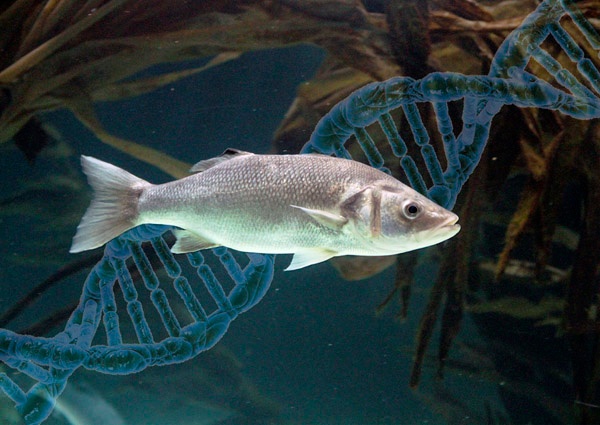
A pioneering study by the Institute of Marine Science (IMC-CSIC) on the European seabass (Dicentrarchus labrax) reveals that thermal stress leaves a heritage “epigenetic inprint”, affecting how future generations respond to climate change.
The discovery shows that high temperatures not only impact the current generation of fish but also compromise the adaptive capacity of their offspring.
Published in Epigenetics & Chromatin, the study provides new evidence on how climate change influences the biology of marine species and has direct implications for aquaculture and conversation.
The key of this phenomenon lies in epigenetics, a process that regulates gene activity without altering the DNA sequence itself. Specifically, the research focused on DNA methylation, a mechanism that acts as a molecular “switch”.
Experiment were carried out on European seabass, a species of great importance in aquaculture and particularly sensitive to temperature variatons. The team exposed both parent fish and their offspring to controlled and elevated temperatures in order to distinguish between direct and inherited (indirect) effects.
Using advanced epigenomic analysis, ICM-CSIC scientists tracked hundreds of thousands of methylation points. The results revealed that 5% of the temperature-induced epigenetic marks in the parents, present in their sperm, are passed no their offspring.
“We observed that certain temperature-induced epigenetic marks in the parents persist in their descendants, even when these have not been exposed to heat themselves,” explains Núria Sánchez-Baizán, first author of the study, now based at IFREMER, France.
Despite the risks, the study also offers an optimistic view of potential adaptation. In many cases, the temperature effects observed in parents and offspring counterbalance each other. This epigenetic buffering effect occurs when fish exposed to high temperatures over two consecutive generations display epigenetic profiles and traits similar to those of individuals never exposed to heat.
More than third of the analysed genomic regions showed signs of such epigenetic compensation, suggesting that the epigenome may act as a flexible buffering system against abrupt environmental changes.
The researchers also found sex-specific differences in response. They analysed key genes involved in sexual development (sox9a and hsd17β10) and confirmed that methylation levels vary with both temperature and sex. These changes may help explain why higher temperatures often increase the proportion of males in seabass populations.
“This helps us better understand how marine species respond to climate change – not only at the genetic level but also epigenetically – yet it also warns us that these responses can be a double-edged sword,” notes Francesc Piferrer (ICM-CSIC), principal investigator of the study.
The research highlights a delicate balance between adaptation and risk, a crucial factor for the management of fishery species and the aquaculture industry in particular.
Understanding these heritable epigenetic mechanisms is vital to developing strategies that mitigate the impacts of global warming. The findings suggest that epigenetics should be integrated into conservation and aquaculture management strategies to ensure the resilience and health of marine species in an increasinlgly warmer ocean.
Reference:
Sánchez-Baizán, N., Allal, F., Vandeputte, M., & Piferrer, F. (2025). Multigenerational temperature effects on paternal epigenetic inheritance in European sea bass. Epigenetics & Chromatin, 18:66.


